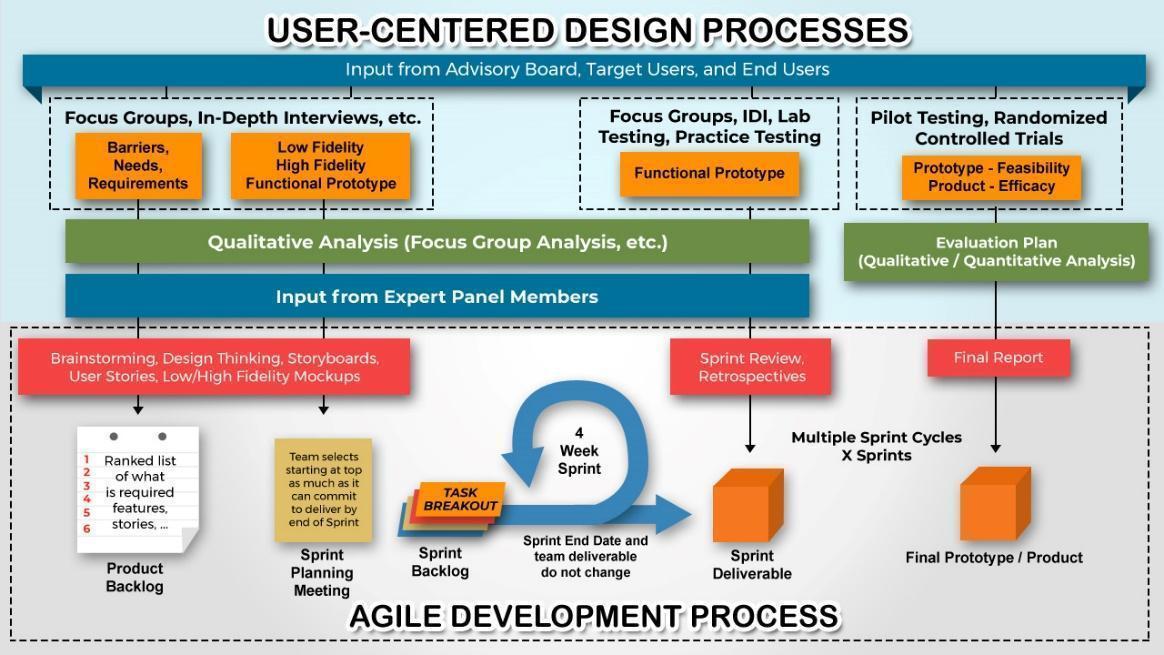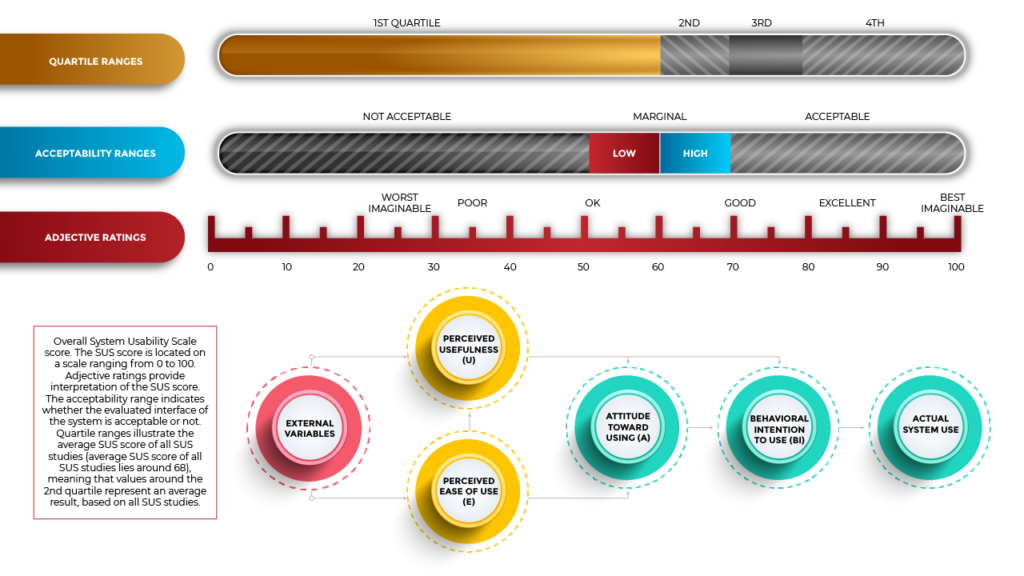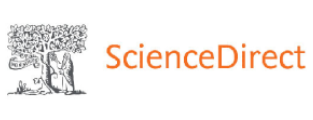We leverage evidence-based, scientific approaches to deliver impact-driven health innovations
Our Product Innovation Process
Benten's Software Development Process for Health Innovation
Benten leverages an evidence-based, theory-driven approach to healthcare innovation. Our belief in innovation is “By the People, With the People, and For the People.” This belief translates into a participatory co-creation process during our customer discovery and software development process using Agile. Our solutions are highly impactful as we leverage behavioral models to drive improvements in health outcomes.
Qualitative Quantitative Research Process and Tools
We leverage focus group discussions (FGD) and in-depth interviews (IDI) to gain insights into how and why people hold certain beliefs about a specific topic or program of interest. A focus group (FG) is defined as a gathering of individuals with shared interests or characteristics, brought together by a moderator. The moderator utilizes the group’s interaction as a means to acquire information and understanding on a particular subject.

Qualitative Research Resources
Focus Groups
Benten follows a systematic, verifiable, and sequential process to qualitative research that leverages focus group interviews, typically 6 – 8 participants in size. The process includes resources and specific standard tools to support the process and qualitative analysis including thematic analysis. Our team of researchers can be involved in the development of focus group moderator guides, focus group materials including recruitment posters, focus group transcription, focus group analysis, and focus group findings report.
In-Depth Interviews
Benten employs a rigorous and structured approach to qualitative research, harnessing the power of in-depth interviews as another tool in our arsenal of research methodology. Our in-depth interview process is designed to deliver valuable insights and understanding, tailored to your unique research objectives. Whether the research project requires developing interview guides, creating recruitment materials, conducting interviews, transcribing content, or analyzing qualitative data, Benten has the expertise to support qualitative research needs. Our commitment to excellence and attention to detail ensure that you receive valuable insights to drive your research forward.
Qualitative Analysis
Benten leverages both NVivo 12 to manage and analyze IDI and focus group qualitative data. The software enables the automatic coding of open-ended questions and the development of matrices to compare answers from different focus groups. It identifies key topics and themes through text search and word frequency queries, as well as categorizes your data.
Card Sorting
Benten can conduct card-sorting workshops to use to understand how users or participants organize and categorize information or concepts for digital health solutions. Card sorting is commonly applied in user experience (UX) research, information architecture design, and usability testing. Card sorting helps researchers and designers gain insights into how individuals naturally group and structure information, which can inform the design of websites, applications, or content organization.
Design Sprints
We leverage design sprints, which are a structured and time-bound approach to problem-solving for digital innovation, particularly popular in the fields of design, product development, and user experience (UX). Design sprints were developed by Google Ventures (now known as GV) and have gained widespread adoption in various industries. Our design sprints typically span a short period, often four-five days, during which a cross-functional team, including users, works intensively to address a specific challenge or opportunity in healthcare.
Prototyping
We keep costs low by building prototypes to help to evaluate design alternatives at any stage of the development process. To facilitate the review and testing of the wireframes, Benten uses a prototyping tool called Figma or other tools to constantly provide its clients with a better idea of the end product. Figma allows for collaborative designing through the hosting of visual storyboards and front-end prototypes of products before development. Figma also supports real-time design presentation and collaboration, seamless design communication, project management, and version control for designs.
User Survey
User surveys are a means of finding out how the software or website is likely to be used by a specific set of users and who these users are likely to be. Benten uses tools such as SurveyMonkey (for online surveys via the web) for online surveys via web/mobile.
Qualitative Research Resources
In-depth Interviews/Focus Group Guide
Benten follows a systematic, verifiable, and sequential process to qualitative research, including conducting (a) in-depth interview (IDI) and (b) focus group interview. The process includes resources and specific standard tools to support the process and qualitative analysis.
In-depth Interviews/Focus Group Materials
Materials for the focus groups are developed using Microsoft PowerPoint, Google Slides, and Wireframes (See Figma) to help facilitate IDI/FGD and feedback on a range of topics.
In-depth Interviews/Focus Group Meeting
Conference Rooms for IDI/FGD. Benten has a large conference room that can hold up to 20 people to conduct demographic data collection sessions to determine the characteristics of the target population of the proposed application to be designed.
Focus Group Recording/Transcription
Focus groups will be audio or video recorded and transcribed for analysis. This ensures the verifiable process our team uses to arrive at the key themes as well as findings from the IDI and FGD.
Qualitative Analysis
Benten leverages both NVivo 12 to manage and analyze IDI and focus group qualitative data. The software enables the automatic coding of open-ended questions and the development of matrices to compare answers from different focus groups. It identifies key topics and themes through text search and word frequency queries, as well as categorizes your data.
Quantitative Research Resources
Benten leverages SPSS, MATLAB, and R software to conduct quantitative research, including analysis of data captured from products based on users’ feedback on a given task (e.g., task-completion times, duration spent, success rates, number of errors) as well as survey analysis to reflect participants’ perception of usability and System Usability Scale.

Behavioral Science
Software Development Resources and Tools
With over 15 years of experience implementing small to large-scale solutions (over $200 million) as well as 10 years in R&D projects for the healthcare industry.
Benten has leverage on multiple research projects including university-funded, foundation funded, Challenge.gov awards, SBIR Phase 1, SBIR Phase 2, Direct-to-Phase 2, Fast Track, R21, R21/R33, and R01 research projects. This covers a multitude of research sponsors including National Institute of Child Health & Human Development (NICHD), National Institute of Mental Health (NIMH), National Institute on Aging (NIA), National Institute on Alcohol Abuse and Alcoholism (NIAAA), National Cancer Institute (NCI), Fogarty International Center (FIC), Centers for Disease Control and Prevention (CDC), National Institute on Drug Abuse (NIDA), National Institute of General Medical Sciences (NIGMS), National Institute of Environmental Health Sciences (NIEHS), National Institute on Minority Health and Health Disparities (NIMHD), Agency for Healthcare Research and Quality (AHRQ), and Department of Transportation(DOT)/Federal Railway Administration (FRA).
Our development approach on multiple projects including Benten has developed a systematic, iterative software development process that leverages user-centered design process with an iterative Agile development methodology to develop Phase 1 minimally viable products (MVP) to demonstrate the feasibility and commercially viable product that demonstrate efficacy and effectiveness. The process diagram below describes the integrated process that leverages input from end users. This is a representative diagram of our process and may not reflect all groups involved (e.g., the Advisory board may or may not be proposed in the project.)

Research Article
Research on women with substance use disorders: Reviewing progress and developing a research and implementation roadmap
Meyer, J., Isaacs, K.R., El Shahawy, O., Burlew, K., and Wechsberg, W.

Research Article
Usability and acceptability testing of a Plan of Safe Care in a mobile health platform
Isaacs, K.R., E. Bajracharya, S. Taylor, Y., K. H. K. Chang, Y. Washio, T. Parker, D. A. Paul, and T. X. Ma

Research paper
Engaging African American Youth in the Development of a Serious Mobile Game for Sexual Health Education: Mixed Methods Study
JMIR Serious Games

Research paper
Relationship between age, sex and pupillary unrest
Journal of Clinical Monitoring and Computing

Research paper
Neonatal Outcomes after Combined Opioid and Nicotine Exposure in Utero: A Scoping Review
International Journal of Environmental Research and Public Health


